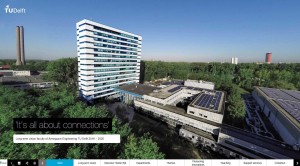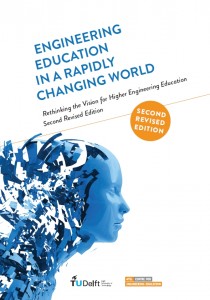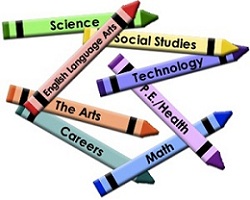Aldert Kamp
Owner Aldert Kamp Advies;
Director of Education Aerospace Engineering;
Leader 4TU.Centre for Engineering Education;
CDIO Co-director;
Member CESAER “Task Force S&T Education for the 21st Century”;
Chair of the Board of LDE Course “Leadership-in-Education”;-
Recent Posts
- Release of book “Navigating the Landscape of Higher Engineering Education” 19/06/2020
- The third stage of life of SCIAMACHY 2&8 Breadboard model 09/02/2020
- Entering into the “Transition Twenties” 02/01/2020
- Integrated-learning-in-context as a holy grail? 08/07/2019
- A colloquium to influence the global state of engineering education 31/05/2019
- 15 Books that help you become your own futurist in education and work 03/01/2019
- Lifelong learning is exploring and enjoying 23/12/2018
- How the pilot of the Joint Interdisciplinary Master Project fell into place 22/11/2018
- Success in study and career highly depends on grit 01/11/2018
- The magic of an Unconference on Impact-Focused Education 20/08/2018
Categories
- Continuous professionalisation (17)
- Curriculum development (15)
- Future engineering skills (27)
- Innovative teaching (25)
- Uncategorized (8)
Tags
- Arts
- behaviour
- career
- CDIO
- CEE
- community
- continous professionalisation
- design
- diversity
- educational change
- employability
- engineering education
- engineering practice
- enterprise
- entrepreneurial
- evidence-based
- exchange
- female
- inclusiveness
- Industry 4.0
- innovative teaching
- interdisciplinary
- intrapreneurial
- lab
- leadership
- living lab
- mindset
- miscellaneous
- multidisciplinary
- online education
- portfolio
- professional profiles
- skills
- Society 5.0
- STEAM
- study abroad
- teaching
- virtual reality
- vision
- VR
- women
Archives
- June 2020 (1)
- February 2020 (1)
- January 2020 (1)
- July 2019 (1)
- May 2019 (1)
- January 2019 (1)
- December 2018 (1)
- November 2018 (2)
- August 2018 (1)
- July 2018 (1)
- June 2018 (1)
- April 2018 (2)
- March 2018 (3)
- February 2018 (2)
- January 2018 (2)
- December 2017 (2)
- November 2017 (2)
- October 2017 (2)
- September 2017 (2)
- August 2017 (1)
- July 2017 (1)
- June 2017 (2)
- May 2017 (2)
- April 2017 (2)
- March 2017 (2)
- February 2017 (2)
- January 2017 (5)
- December 2016 (2)
Subscribe for updates
In black banner of the HeaderMeta
Interdisciplinary education: a wave of the future?
Posted in Continuous professionalisation, Curriculum development, Future engineering skills, Innovative teaching
Tagged engineering education, interdisciplinary, lab, living lab, multidisciplinary, vision
Comments Off on Interdisciplinary education: a wave of the future?
Labs and makerspaces create a sense of belonging and bring students face-to-face with engineering practice
At the festive opening of the new and renovated Aerospace Structures and Materials Lab at TU Delft Faculty of Aerospace Engineering 27th January 2017, I presented my viewpoint that educating the next generation of aerospace engineers should address more skills that are gaining prominence in future engineering practice, and that the renovated and new labs provide excellent opportunities for their learning and teaching.
Posted in Future engineering skills, Innovative teaching
Tagged community, engineering education, engineering practice, lab, skills, vision
Leave a comment
A Rapidly Changing World: time already for a 3rd revised edition of my book?
A brief post with a humorous undertow.
In June I published the Second Revised Edition of my book “Engineering Education in a Rapidly Changing World“. On page 22 I included the disclaimer “What we do know is that tomorrow’s world will be an intense VUCA world… great advances are unpredictable, future scenarios thus full of uncertainty. We might miss a next revolution…..”
I had not expected that in less than seven months after its publication I already had missed the first revolution. Continue reading
You can always write blogposts, but not always make memories
This morning I was engaged in drafting a blogpost about the role of labs and makerspaces in our engineering education. Until my son and daughter came to me with the best proposal this Sunday: “Let’s see where we can skate”. Since we are living in the Green Heart of Holland, in a former swamp area, we have a very green landscape which is rich in undeep waterways that freeze easily. In former times many of these waterways were used by flat wide boats to transport the peat from the swamp area to the city of Amsterdam for heating. Today their main function is water management, to prevent the flooding of our deep polders. And when it starts freezing, they are the place to be if you like skating. Continue reading
Educating engineers for a resource constrained future: do we understand what we are doing?
![CDIO_coated_TM [Converted]_jpeg](https://aldertkamp.weblog.tudelft.nl/files/2017/01/CDIO_coated_TM-Converted_jpeg-300x188.jpg) Has it ever been different?
Has it ever been different?
“Engineering Opportunities in a Resource Constrained Future”. When I read this theme of the CDIO European Regional Meeting at Trinity College Dublin on 12-13 January 2017 the very first time, I wondered: “Has it ever been different?” Have we ever had an age where we had an unlimited amount of resources in engineering or engineering education? In my keynote “Adapting engineering education to change” I therefore started with the question which resource constrains us most in higher engineering education. Is it the growing number or attitude of students, the number or capabilities of staff, or the facilities to accommodate all students or new pedagogy? In the end of course everything can be expressed in terms of money. But I believe the major constraining resource is TIME: the consensus is that we as engineering educators can’t keep up with the pace of change in engineering knowledge and methods, the changing needs by our graduates, and the emerging technologies in education.
Vision on TU Delft Aerospace Engineering Education 2020
A new Long-term Vision
Mid November 2016, my faculty of Aerospace Engineering published its long-term vision in the form of the online magazine “Long-term Vision of the Faculty of Aerospace Engineering TU Delft 2016 – 2020: ‘It’s all about connections“. In this vision the (former) Dean, I as the Director of Education, and the departmental directors, theme organisers, project leaders and others address in personal interviews the question of how the faculty can make an optimum contribution to society at a time when everything is increasingly revolving around connections. 
Since many of my blog followers have no affiliation with TU Delft but do share, I presume, my interest in the vision on engineering education, I have copied the full text about the Bachelor and Master Education into this blog post. A complementary vision on education, more specifically on Online Education, was established by my colleague Renee van de Watering and is available here. Continue reading
Posted in Curriculum development, Future engineering skills
Tagged engineering education, vision
Leave a comment
An innovative educational framework that lies on your doorstep
Most curriculum innovations fail
As a board member of the Educational Leadership Course that is organised under the sponsorship of Erasmus University, TU Delft and University Leiden (LDE), I reviewed the application files of the 17 candidates for the course in 2017. An important component in these files is the plan for the individual education innovation project. These projects are supposed to be the “mental organiser” for the participants during the 1-year course. Reviewing the files I noticed that quite a number of innovation projects at the three universities are about an upgrading or restructuring of Bachelor or Master curricula. Each one will be a challenge, because we know that most curriculum innovations fail, don’t we..? Continue reading
Preparing for change before it happens
“The chief characteristic of the modern world is the scope and speed of change” (Tony Blair)

Last summer I published the 2nd revised edition of my vision on engineering education of the future. With this vision I call higher management, educational leaders, programme coordinators and lecturers to dare look beyond their discipline specialisation at the ever faster changing outside world. We can no longer stick our heads in the sand and refuse to see that both technology and society are fundamentally reshaping the engineering profession.It is obvious that many curricula do not keep up with the changing needs of the job market, no matter whether it is the academic, industrial, or new ventures market.
We are proud of the reputation of the Delft engineers. They are internationally well known for their specialist knowledge, their ability to cooperate in the global world, and their open mind. We are strong in educating research scientists. We can be happy with the education we have, but we also have to think how future proof it is. Young engineering graduates often need stronger skills in for instance creative thinking, systems and holistic thinking, entrepreneurial behaviour, interdisciplinary thinking, and algorithmic thinking. These skills are gaining quickly in importance.
In the past thirty to forty years engineering education has become increasingly engineering science driven. That is a worldwide trend. Ideally speaking, the analytical approaches of engineering science and engineering practice should be balanced and stimulate each other in our education. The trend, however, is that the engineering science component has become much more important than engineering practice and design.This makes that graduates of engineering programmes are not always optimally prepared for their future job and may encounter problems in future when they have to adjust to the fast changes by lifelong learning.
Since 2013 I have immersed myself in the future developments of higher engineering education with a horizon of 2030, at programme level at the faculty of Aerospace Engineering, at institutional level, the four Dutch technical universities, and as a thought leader in the global CDIO network.
Welcome to my blog. My aim is to inform you at regular intervals about developments in higher engineering education and society, and events in my neighbourhood that strike, inspire and fascinate me, and keep me busy in my rethinking of engineering education. Probably they will keep me more than busy, because I expect that we may have to change engineering education more profoundly and rapidly than we have done over the past 40 years.
I hope you will also enjoy the photos I have taken of beautiful sceneries that I will randomly change in the header of my blog.
Posted in Future engineering skills
Tagged educational change, engineering education, vision
Leave a comment

 Also at my university, though rigidly organised in disciplinary silos and producing disciplinary programmes, I hear the buzzwords “multidisciplinarity” and “interdisciplinarity” almost every day. Obviously there is a shift of interest towards exploring questions and solving problems that cross borders and engage with experts from multiple fields. Quite some universities in Europe, the Americas and Asia make even bigger steps. They develop “liberal engineering” study programmes with the aim to bring broader education with more holistic thinking and societal context to engineering students.
Also at my university, though rigidly organised in disciplinary silos and producing disciplinary programmes, I hear the buzzwords “multidisciplinarity” and “interdisciplinarity” almost every day. Obviously there is a shift of interest towards exploring questions and solving problems that cross borders and engage with experts from multiple fields. Quite some universities in Europe, the Americas and Asia make even bigger steps. They develop “liberal engineering” study programmes with the aim to bring broader education with more holistic thinking and societal context to engineering students.

